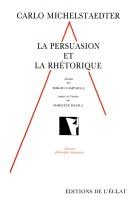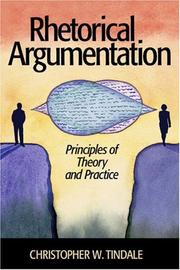| Listing 1 - 10 of 21 | << page >> |
Sort by
|
Book
ISBN: 9781032353128 9781032353135 9781003326328 Year: 2023 Publisher: New York, N.Y. Routledge, Taylor & Francis Group
Abstract | Keywords | Export | Availability | Bookmark
 Loading...
Loading...Choose an application
- Reference Manager
- EndNote
- RefWorks (Direct export to RefWorks)
"This accessible book provides a practical discussion of the main elements of argumentation as illustrated by 30 public arguments from a recent year on a wide variety of social, cultural, and scientific topics. Arguing is an important form of communication in any society and a principal way in which ideas are exposed, discussed, and modified. The real-life examples examined in this book reflect the different considerations that go into composing arguments and the range of strategies that can be chosen as vehicles for our positions. They demonstrate the roles that emotion can play along with other modes of conveying evidence, from the use of images to the use of gestures. They show the power of threats, comparisons, and consequences. What emerges is an instructive discussion that illustrates the way we argue and that shows argument, invention, and evaluation in action. This book is a stimulating read for anyone interested in argument and public discourse and can be used as a supplemental text for courses in argumentation, persuasive communication, critical thinking, composition, and informal logic"--
Persuasion (Rhetoric) --- Reasoning. --- Mass communications --- Pragmatics --- Persuasion (rhétorique) --- Raisonnement. --- Persuasion (rhétorique)
Book
ISBN: 9782252037201 Year: 2009 Publisher: [Paris] : Klincksieck,
Abstract | Keywords | Export | Availability | Bookmark
 Loading...
Loading...Choose an application
- Reference Manager
- EndNote
- RefWorks (Direct export to RefWorks)
Persuasion (rhétorique). --- Éloquence politique. --- Machiavel, --- Cicéron, --- Kafka, Franz, --- Critique et interprétation. --- Critique et interprétation. --- Critique et interprétation.
Dissertation
Year: 1960 Publisher: Paris : Presses Universitaires de France,
Abstract | Keywords | Export | Availability | Bookmark
 Loading...
Loading...Choose an application
- Reference Manager
- EndNote
- RefWorks (Direct export to RefWorks)
Persuasion (Rhetoric) --- Philosophy, Ancient. --- Rhetoric, Ancient. --- Persuasion (rhétorique). --- Rhétorique antique. --- Cicero, Marcus Tullius --- Cicéron, --- Criticism and interpretation. --- Philosophie.

ISBN: 0199263469 0191514101 Year: 2003 Volume: *28
Abstract | Keywords | Export | Availability | Bookmark
 Loading...
Loading...Choose an application
- Reference Manager
- EndNote
- RefWorks (Direct export to RefWorks)
Persuasion (Rhetoric) --- Persuasion (Rhétorique) --- Early works to 1800. --- Ouvrages avant 1800 --- Cicero, Marcus Tullius. --- Persuasion (Rhétorique) --- Forensics (Public speaking) --- Oratory --- Rhetoric --- Early works to 1800

ISBN: 2905372362 9782905372369 Year: 1989 Volume: 13 Publisher: Combas : Éditions de l'Éclat,
Abstract | Keywords | Export | Availability | Bookmark
 Loading...
Loading...Choose an application
- Reference Manager
- EndNote
- RefWorks (Direct export to RefWorks)
Rhetoric --- Persuasion (Rhetoric) --- Rhétorique --- Argumentation --- Rhétorique. --- Persuasion (Rhétorique) --- Rhétorique --- Overtuigen (Retorica) --- Retorica --- CDL --- 1 --- Rhétorique antique. --- Persuasion (rhétorique). --- Philosophie et rhétorique. --- Objectivité.
Book

ISBN: 3110757257 9783110757255 9783110757156 Year: 2021 Publisher: Berlin Boston
Abstract | Keywords | Export | Availability | Bookmark
 Loading...
Loading...Choose an application
- Reference Manager
- EndNote
- RefWorks (Direct export to RefWorks)
Bridging theoretical modelling and advanced empirical techniques is a central aim of current linguistic research. The progress in empirical methods contributes to the precise estimation of the properties of linguistic data and promises new ways for justifying theoretical models and testing their implications. The contributions to the present collective volume take up this challenge and focus on the relevance of empirical results achieved through up-to-date methodology for the theoretical analysis and modelling of argument structure. They tackle issues of argument structure from different perspectives addressing questions related to diverse verb types (unaccusatives, unergatives, (di)transitives, psych verbs), morpho-syntactic operations (prefixation, simple vs. particle verbs), case distinctions (dative vs. accusative, case vs. prepositions), argument and voice alternations (dative vs. benefactive alternation, active vs. passive), word order alternations and the impact of animacy, agentivity, and eventivity on argument structure. The volume will be of interest to theoretical linguists, psycholinguists, and corpus linguists interested in the syntax of argument structure and its modelling using precise empirical methods.
LANGUAGE ARTS & DISCIPLINES / Linguistics / Syntax. --- Argument Alternations. --- Arrgument Structure. --- Voice, Case. --- E-books --- Persuasion (Rhetoric) --- Grammar, Comparative and general --- Syntax. --- Persuasion (rhétorique) --- Syntaxe. --- Linguistics --- Research. --- Persuasion (rhétorique)
Book
ISBN: 2743607513 Year: 2001 Volume: 330 Publisher: Paris : Payot & Rivages,
Abstract | Keywords | Export | Availability | Bookmark
 Loading...
Loading...Choose an application
- Reference Manager
- EndNote
- RefWorks (Direct export to RefWorks)
Pensée --- Raison --- Géométrie --- Persuasion (Rhétorique) --- Raisonnement --- Ouvrages avant 1800 --- Ouvrages avant 1800 --- Philosophie --- Ouvrages avant 1800 --- Ouvrages avant 1800 --- Ouvrages avant 1800

ISBN: 1412903998 1412904005 1452204489 1322282854 1452222290 9781452222295 9781452204482 9781452238326 1452238324 9781412903998 9781412904001 9781322282855 Year: 2004 Publisher: Thousand Oaks, Calif. Sage Publications
Abstract | Keywords | Export | Availability | Bookmark
 Loading...
Loading...Choose an application
- Reference Manager
- EndNote
- RefWorks (Direct export to RefWorks)
By encouraging readers to think about the ways they encounter arguments, this text presents argumentation through the idea of an invitational rhetoric.
Persuasion (rhétorique) --- Persuasion (Rhetoric) --- #KVHA:Retoriek --- #KVHA:Argumentatie --- Persuasion (Rhetoric). --- Languages & Literatures --- Literature - General --- Rhetoric. --- Language and languages --- Speaking --- Rhetoric --- Authorship --- Expression --- Literary style --- Forensics (Public speaking) --- Oratory --- Persuasion (rhétorique)
Book
ISBN: 9783110224177 Year: 2010 Volume: 284 Publisher: Berlin New York : de Gruyter,
Abstract | Keywords | Export | Availability | Bookmark
 Loading...
Loading...Choose an application
- Reference Manager
- EndNote
- RefWorks (Direct export to RefWorks)
Oratory, Ancient. --- Rhetoric, Ancient --- Historiography --- Speeches, addresses, etc., Greek --- Speeches, addresses, etc., Latin --- Historiography. --- History and criticism. --- Oratory, Ancient --- Ancient rhetoric --- Classical languages --- Greek language --- Greek rhetoric --- Latin language --- Latin rhetoric --- History and criticism --- Rhetoric --- Débats et controverses --- Historiographie ancienne --- Persuasion (rhétorique) --- Rhétorique --- Histoire et critique --- Antiquité
Book
ISBN: 9789027233509 9027233500 Year: 2013 Volume: 15 Publisher: Amsterdam ; Philadelphia : John Benjamins Publishing Company,
Abstract | Keywords | Export | Availability | Bookmark
 Loading...
Loading...Choose an application
- Reference Manager
- EndNote
- RefWorks (Direct export to RefWorks)
By taking an interdisciplinary approach -- with methods drawn from narratology, aesthetics, social psychology, education, and the empirical study of literature -- The Art of Sympathy in Fiction will interest scholars in a variety of fields. Its focus is the sympathetic effects of stories, and the possible ways these feelings can contribute to what has been called the "moral imagination." Part I examines the dynamics of readers' beliefs regarding fictional characters and the influence of those impressions on the emotions that readers experience. The book then turns its attention to sympathy, providing a comprehensive definition and considering the ways in which it operates in life and in literature. Part I concludes with a discussion of the narratological and rhetorical features of fictional narratives that theoretically elicit sympathy in readers. Part II applies these theories to four stories that persuade readers to sympathize with characters who seem unsympathetic. Finally, based on empirical findings from the responses of adolescent readers, Part III considers pedagogical approaches that can help students reflect on emotional experiences that result from reading fiction.
American fiction --- Sympathy in literature --- Literature and morals --- Books and reading --- History and criticism --- Littérature américaine --- Empathie (esthétique) --- Persuasion (rhétorique) --- Histoire et critique. --- Sympathy in literature. --- Literature and morals. --- Books and reading. --- History and criticism. --- Littérature américaine --- Empathie (esthétique) --- Persuasion (rhétorique)
| Listing 1 - 10 of 21 | << page >> |
Sort by
|

 Search
Search Feedback
Feedback About UniCat
About UniCat  Help
Help News
News